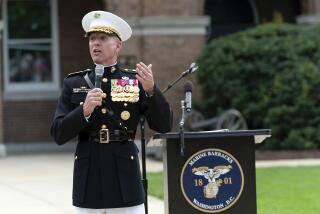Head of Navy Division Is Promoted to Rear Admiral
- Share via
POINT MUGU — At 12, Charles “Bert” Johnston Jr. wanted to fly. So in the summer of 1973, he joined the Navy and took to the seas, then eventually the air.
Last week, Johnston, who heads the Naval Air Warfare Center Weapons Division, was officially promoted from captain to rear admiral, putting him in the echelon of the Navy’s highest-ranking officials.
Johnston, 51, stepped in line for the promotion when he became commander of the weapons division in January 1999.
After months of waiting, he pinned his first admiral’s star on his sleeve last week, joining the ranks of nearly 400 admirals throughout the Navy and Marine Corps.
Johnston is in charge of about 1,900 workers at Point Mugu and another 3,064 at the facility’s sister bases in China Lake and White Sands, N. M., spokeswoman Doris Lance said. His facilities test missiles and other weapons, planning for what Johnston calls “the battlefield of the future.”
For the veteran aviator, overseeing the Navy’s weapons systems is a far cry from flying the F-18s and P3-Orions he still sometimes takes to the skies.
While he relishes that feeling of control in the cockpit, making 5,000 people work together isn’t as simple as banking an airplane, he said.
But Johnston, who lives in China Lake, sees his post as head of the weapons division as coach and mentor.
In his Point Mugu office Thursday, surrounded by model jets and ornate gifts from Japanese military officials who have tested weapons at the center, Johnston recalled an admiral he met 20 years ago who said, “I never made a decision to stay in the Navy; I just never got out.”
Johnston, who is a graduate of the Naval Test Pilot School with a master’s degree in aeronautical engineering, feels the same way.
His appointment as rear admiral will let him stay in the Navy longer, he said. While officers must step down after 30 years, admirals can serve longer.
With his latest promotion, Johnston has joined the ranks of what he calls “the vice presidents” of the Navy, a sort of fraternal group steeped in tradition.
*
As word spread that he had been tapped for the promotion, he received letters from other admirals.
The letters represent a long-standing ritual, he said.
One admiral wrote: “As you get more stars, you don’t get smarter, you get more powerful. Be careful to listen to those underneath you.”
Another said: “You’ll never have a bad meal or hear the total truth again.”
More to Read
Sign up for Essential California
The most important California stories and recommendations in your inbox every morning.
You may occasionally receive promotional content from the Los Angeles Times.












